新版-译林牛津版小学英语五年级英语上册知识点总结
牛津译林版-英语-五年级上册-unit1Golilocks and the three bears单元知识提纲-译林版

译林版五上Unit1单元知识提纲一、掌握词汇:1. bear 熊2.forest 森林3.there(与be 连用)4.house 房子5.soup 汤6. room 房间7. hard 硬的8. soft 软的9 afraid 害怕的10.her 她的11.Help!救命12. really 真的13.beside 在……旁边14. between 在……中间15. then 然后16. find 找到,发现17. their 他们的;她们的二、掌握词组:1.in the forest 在森林里2. a beautiful house 一个漂亮的房子3.hungry and thirsty 又饿又渴4.some soup 一些汤5.too hard /hot/cold 太硬/热/冷6. a soft bed 一张柔软的床7.just right 正合适8.be afraid 害怕9.three bears 三只熊10.in front of 在……前面11.beside the bed 在床的旁边12.between the two chairs 在两把椅子之间13.remember these words 记住这些单词14.be popular 流行的,受欢迎的15.in Western countries 在西方国家16..in China 在中国17.have some cakes 吃一些蛋糕18.in the kitchen 在厨房里19.find their cousin 找到他们的表弟20.on the fridge 在冰箱上21.t he sound of the letter “C”字母“C”的发音三、掌握重点句型:1. There is a house in the forest. 森林里有一座房子。
2 .There is some soup on the table. 桌上有一些汤。
五年级英语上册Unit 4知识点整理(江苏译林牛津版)
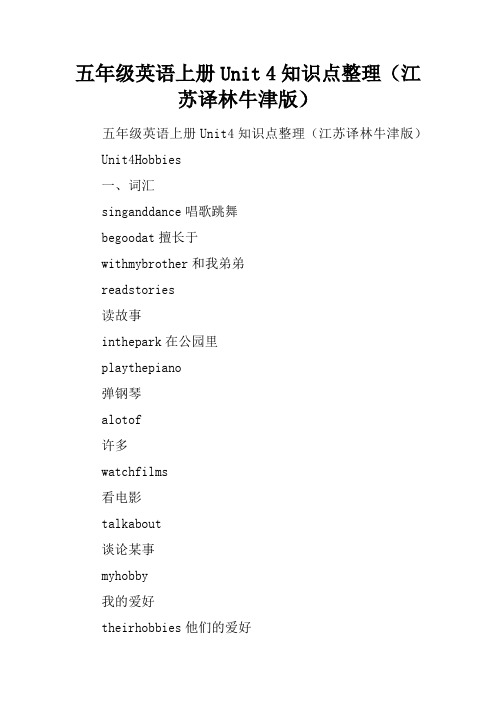
五年级英语上册Unit 4知识点整理(江苏译林牛津版)五年级英语上册Unit4知识点整理(江苏译林牛津版)Unit4Hobbies一、词汇singanddance唱歌跳舞begoodat擅长于withmybrother和我弟弟readstories读故事inthepark在公园里playthepiano弹钢琴alotof许多watchfilms看电影talkabout谈论某事myhobby我的爱好theirhobbies他们的爱好inwinter在冬天verywell很好anidea一个主意agreatidea一个好主意thisafternoon今天下午ontheice在冰上begoodatskating擅长溜冰abighole一个大洞intheice在冰里coldandwet又冷又湿likeclimbing喜欢爬山likeswimming喜欢游泳likedrawing喜欢画画playbasketball打篮球playtabletennis打乒乓playfootball踢足球二、句型.whatdoyoulikedoing?你喜欢干什么?Ilikeplayingbasketballandfootball.我喜欢打篮球和踢足球。
2.Icanplaybasketballwell,butI’mnotgoodatfootball.我篮球打得很好,但我不擅长足球。
3.Helikesplayingfootballtoo.他也喜欢踢足球。
4.Shealsolikesplayingthepiano.她也喜欢弹钢琴。
5.Theybothlikeswimming.她们都喜欢游泳。
6.whatdoeshelikedoing?他喜欢干什么?Helikesdrawing.他喜欢画画。
7.whatdoesshelikedoing?她喜欢干什么?Shelikesreadingstories.她喜欢读故事。
8.whatdotheylikedoing?她们喜欢干什么?Theylikewatchingfilms.她们喜欢看电影。
五年级英语上册Unit6知识点整理江苏译林牛津版

五年级英语上册Unit 6知识点整理(江苏译林牛津版)五年级英语上册Unit6知识点整理(江苏译林牛津版)Unit6知识点梳理一、辞汇e-friend我的网友intheplagrund在操场上aitainute等一会sendthiseail发这封电子邮liveintheU住在英国elevenearsld1岁speahinese讲中文havehineselessns有语文atshl在学校studhinese学习汉语aftershl下学后hatsubets什么学科lieathsandPE喜爱数学和体育dn’trr别担忧siell游得好eatfish吃鱼atasnabar在一家小吃店gfishing去钓鱼begdatfishing擅长钓鱼teahu教你sitbtheriver坐在河旁anfish许多鱼liveinanada住在加拿大begdatEnglish擅长英语inAustralia在澳大利亚inhina在中国trrrning明天早上☆nabuttheseuntries了解这些国家☆ininter在冬季☆turntie变成冰☆theintereather冬季的天气☆eararlthes穿暖和的衣服☆hineseaddresses中文地址☆riteEnglishaddresses写英文地址☆nabuture-friends了解你的网友们二、句型Duhaveane-friend?你有一名网友吗?es,Id是的,我有。
2Dtheliesiing?他们喜爱游泳吗?N,thedn’t不,他们不喜爱。
3Deshehavehineselessns?他有语文吗?es,hedes是的,他有。
4Dessheliesinging?她喜爱唱歌吗?N,shedesn’t不,她没有。
hatsubetsdeshelie?他喜爱什么学科?HeliesathsandPE他喜爱数学和体育。
6hatsubetsdesshelie?她喜爱什么学科?SheliesusiandArt她喜爱音乐和美术。
五年级英语上册Unit7知识点整理江苏译林牛津版
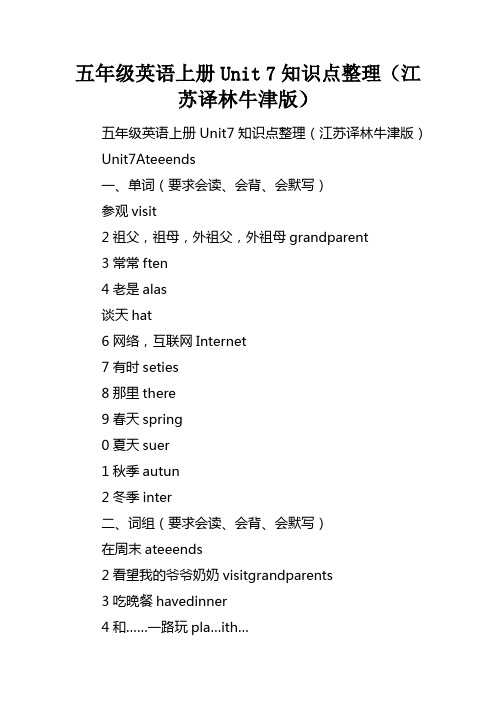
五年级英语上册Unit 7知识点整理(江苏译林牛津版)五年级英语上册Unit7知识点整理(江苏译林牛津版)Unit7Ateeends一、单词(要求会读、会背、会默写)参观visit2祖父,祖母,外祖父,外祖母grandparent3常常ften4老是alas谈天hat6网络,互联网Internet7有时seties8那里there9春天spring0夏天suer1秋季autun2冬季inter二、词组(要求会读、会背、会默写)在周末ateeends2看望我的爷爷奶奶visitgrandparents3吃晚餐havedinner4和……一路玩pla…ith…和他们的猫一路玩plaiththeirat6放风筝flaite7咱们的父母urparents8住在英国liveintheU9在网上谈天hatntheInternet0和她的网友谈天hatithhere-friend 1和他/她谈天hatithhi/her2和他们谈天hatiththe3怎么样hatabut4去电影院gttheinea上舞蹈havedaninglessns6踢足球plaftball7野餐haveapini8她的/他的朋友们her/hisfriends 9去公园gtthepar20我的家人fail21在公园里inthepar22造访李教师visitissLi23给咱们看花shustheflers24看电视athTV2吃很多eatalt26打篮球plabasetball27去游泳gsiing28出来eut29出去getut30去野餐gandhaveapini31太胖tfat32喜爱野餐liepinis33喜爱打篮球lieplaingbasetball34我的父母parents3上havelessns36超级喜爱猫lieatsveruh37一朵漂亮的玫瑰anierse三、句型(要求会读、会背、会默写)hatdudateeends?Iusuallvisitgrandparentsateeends 你在周末做什么?我通常看望我的祖父母。
牛津译林版小学英语五年级上学期语法知识点汇总
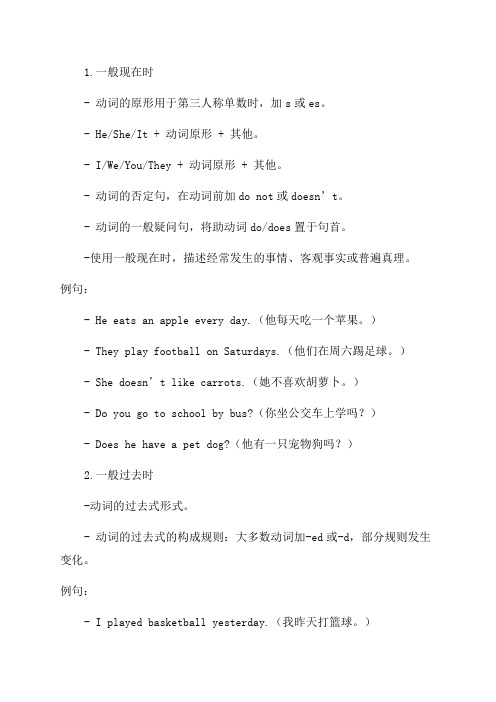
1.一般现在时- 动词的原形用于第三人称单数时,加s或es。
- He/She/It + 动词原形 + 其他。
- I/We/You/They + 动词原形 + 其他。
- 动词的否定句,在动词前加do not或doesn’t。
- 动词的一般疑问句,将助动词do/does置于句首。
-使用一般现在时,描述经常发生的事情、客观事实或普遍真理。
例句:- He eats an apple every day.(他每天吃一个苹果。
)- They play football on Saturdays.(他们在周六踢足球。
)- She doesn’t like carrots.(她不喜欢胡萝卜。
)- Do you go to school by bus?(你坐公交车上学吗?)- Does he have a pet dog?(他有一只宠物狗吗?)2.一般过去时-动词的过去式形式。
- 动词的过去式的构成规则:大多数动词加-ed或-d,部分规则发生变化。
例句:- I played basketball yesterday.(我昨天打篮球。
)- She didn’t wat ch TV last night.(昨晚她没看电视。
)- Did you visit your grandparents last weekend?(你上周末去看望你的祖父母了吗?)- Did they have breakfast at home this morning?(他们今天早上在家吃早餐了吗?)3.现在进行时- am/is/are + 动词的ing形式 + 其他。
-表示现在正在进行的动作。
-“现在正在进行”可以和“现在正在发生”混淆,要根据上下文进行判断。
例句:- She is eating lunch now.(她现在正在吃午饭。
)- They are playing basketball in the park.(他们正在公园打篮球。
牛津译林版五年级上册英语知识点清单必会单词短语句子大全

牛津译林版五年级上册英语知识点清单必会单词短语句子大全Unit 1 单元知识【词组】1.in the forest 在森林里2.in the house在房子里3.hungry and thirsty又饿又渴4.some soup一些汤5.on the table在桌子上6.too cold 太凉7.too hot太热8.just right正好9.in the room在房间里10.too hard太硬11.too soft太软12.be afraid害怕的13.three bears三只熊14.in front of her在她的前面15.put on your coats穿上你的外套16.in China在中国17.have some cakes吃一些蛋糕18.in the kitchen 在厨房里19.in the fridge 在冰箱里20.find their cousin 找到他们的表弟【句子】1.There is a house in the forest.森林里有一座房子。
2.What a beautiful house!多么漂亮的一座房子啊!3.There is some soup on the table.桌子上有一些汤。
4.This soup is just right.这汤正好。
5.There are three beds in the room.房间里有三张床。
6.This bed is too hard.这张床太硬了。
7.You can have some cakes.你可以吃一些蛋糕。
8.Where are the cakes?蛋糕在哪里?9.Bobby cannot see any cakes in the fridge.博比在冰箱里一块蛋糕都没见。
10.There aren’t any cakes here.这里一块蛋糕都没有。
【语法知识】There be 句型的用法:(1)there be句型,意思是有,表示某处有某人或某物。
译林版五年级牛津英语上册知识点总结
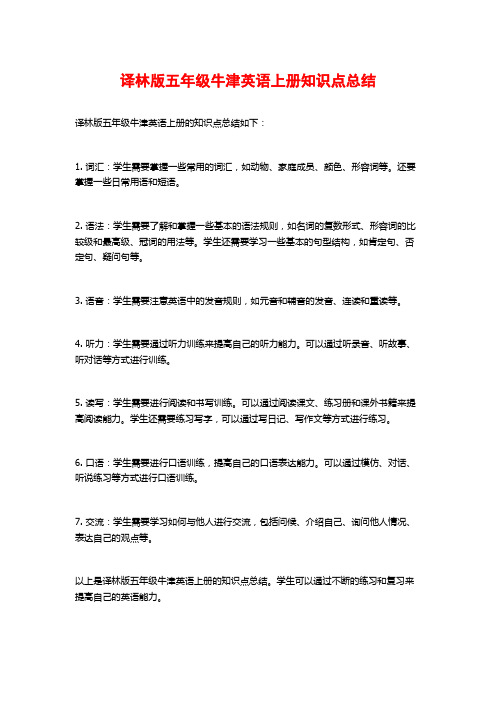
译林版五年级牛津英语上册知识点总结
译林版五年级牛津英语上册的知识点总结如下:
1. 词汇:学生需要掌握一些常用的词汇,如动物、家庭成员、颜色、形容词等。
还要掌握一些日常用语和短语。
2. 语法:学生需要了解和掌握一些基本的语法规则,如名词的复数形式、形容词的比较级和最高级、冠词的用法等。
学生还需要学习一些基本的句型结构,如肯定句、否定句、疑问句等。
3. 语音:学生需要注意英语中的发音规则,如元音和辅音的发音、连读和重读等。
4. 听力:学生需要通过听力训练来提高自己的听力能力。
可以通过听录音、听故事、听对话等方式进行训练。
5. 读写:学生需要进行阅读和书写训练。
可以通过阅读课文、练习册和课外书籍来提高阅读能力。
学生还需要练习写字,可以通过写日记、写作文等方式进行练习。
6. 口语:学生需要进行口语训练,提高自己的口语表达能力。
可以通过模仿、对话、听说练习等方式进行口语训练。
7. 交流:学生需要学习如何与他人进行交流,包括问候、介绍自己、询问他人情况、表达自己的观点等。
以上是译林版五年级牛津英语上册的知识点总结。
学生可以通过不断的练习和复习来提高自己的英语能力。
五年级英语上册Unit 7知识点整理(江苏译林牛津版)
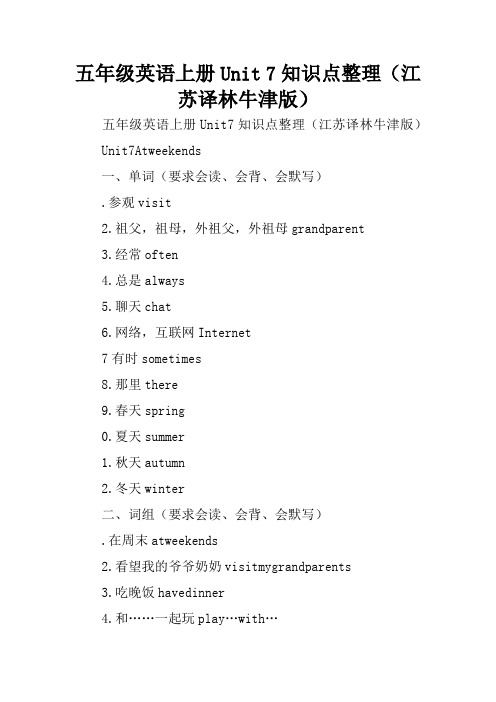
五年级英语上册Unit 7知识点整理(江苏译林牛津版)五年级英语上册Unit7知识点整理(江苏译林牛津版)Unit7Atweekends一、单词(要求会读、会背、会默写).参观visit2.祖父,祖母,外祖父,外祖母grandparent3.经常often4.总是always5.聊天chat6.网络,互联网Internet7有时sometimes8.那里there9.春天spring0.夏天summer1.秋天autumn2.冬天winter二、词组(要求会读、会背、会默写).在周末atweekends2.看望我的爷爷奶奶visitmygrandparents3.吃晚饭havedinner4.和……一起玩play…with…5.和他们的猫一起玩playwiththeircat6.放风筝flyakite7.我们的父母ourparents8.住在英国liveintheUk9.在网上聊天chatontheInternet0.和她的网友聊天chatwithhere-friend1.和他/她聊天chatwithhim/her2.和他们聊天chatwiththem3.怎么样whatabout4.去电影院gotothecinema5.上舞蹈课havedancinglessons6.踢足球playfootball7.野餐haveapicnic8.她的/他的朋友们her/hisfriends9.去公园gotothepark20.我的家人myfamily21.在公园里inthepark22.拜访李老师visitmissLi23.给我们看花showustheflowers24.看电视watchTV25.吃很多eatalot26.打篮球playbasketball27.去游泳goswimming28.出来comeout29.出去getout30.去野餐goandhaveapicnic31.太胖toofat32.喜欢野餐likepicnics33.喜欢打篮球likeplayingbasketball34.我的父母myparents35.上课havelessons36.非常喜欢猫likecatsverymuch37.一朵漂亮的玫瑰anicerose三、句型(要求会读、会背、会默写).whatdoyoudoatweekends?Iusuallyvisitmygrandpare ntsatweekends.你在周末做什么?我通常看望我的祖父母。
- 1、下载文档前请自行甄别文档内容的完整性,平台不提供额外的编辑、内容补充、找答案等附加服务。
- 2、"仅部分预览"的文档,不可在线预览部分如存在完整性等问题,可反馈申请退款(可完整预览的文档不适用该条件!)。
- 3、如文档侵犯您的权益,请联系客服反馈,我们会尽快为您处理(人工客服工作时间:9:00-18:30)。
在楼层前用介词 on on the first /second/ third floor 在一/二/ 三楼...
Unit 3 Our animal friends
一、单词(默写) 1 One.. The other... 一个.. 另一个.. 2 Body 身体 3 no 没有 4 leg 腿 5 Or 也不,也没有 6 arm 手臂 7 wing 翅膀 8 foot 脚,足 9 rabbit 兔子 10 give 给 11 finger 手指
t) see any cakes in the fridge.
5 感叹句的结构:感叹句常用 how 或 what 来引导 (1) what 引导的感叹句
a.What+a/an+ 形容词 +可数名词单数! What a beautiful house!
b.What+形容词 +可数名词复数!
What nice dresses!
四、语法点(理解) 1 How many...( 可数名词复数 ) are there...? 用于询问某处有多少 ... 例:How many classrooms are there in our school?
2 There be 的一般疑问句 是将 be 动词提前到 there 的前面,表示“有 ? ”
6 正合适 just right
7 房间 room
8 硬的 hard
9 柔软的 soft
10 害怕的 afraid
11 他们的 their
12 她(宾格) her
13 救命 help
14 在⋯⋯旁边 beside
15 在⋯⋯中间 between
16 真正地 really
17 然后 then
18 找到,发现 find
19 在⋯⋯前面 in front of
二、短语(默写) 1 在森林里 in the forest 2 一座漂亮的房子 a beautiful house 3 又饿又渴 hungry and thirsty 4 一些汤_ some soup 5 太冷 too cold
6 太热 too hot 7 三只熊 three bears 8 太硬 too hard 9 在她前面 in front of her 10 太软 too soft 11 在我前面 in front of me 12 找到他们的表弟 find their cousin 13 在西方国家 in Western countries 14 吃些蛋糕 have some cakes 15 在玻璃杯里 in the glass 16 穿上你们的外套 put on your coats 17 在桌子上 on the table 18 在中国 in China 19 正合适,正好 just right 20 在树上(外来)in the tree 21 在房间里_ in the room 22 得了感冒 Have a cold 23 一杯牛奶 a glass of milk 24 在厨房里_ in the kitchen 25 在课桌之间_ between the desks 26 在冰箱里,in the fridge 27 在盒子里 in the box
(2)There are
用于可数名词的复数,如:
There are some desks in the classroom.
(3)There be 近的物品选用
句型的就近原则: be 动词后面如果跟的是不止一种物品,就根据离它 最 is 或 are. 如: There are some pictures and a telephone.
11 一间音乐室 a music room 12 一间美术室 an art room 13 乒乓球室 table tennis room 14 在操场上 in the playground 15 如此重 so heavy 16 太高 too high 17 很有趣 great fun 18 推我 push me 19 在美国 in the US 20 去玩一玩 go and play 21 在英国 In the UK 22 再玩一~次 play again 23 去电影院 go to the cinema 24 在秋千上 on the swing 25 吃一个冰淇淋 have an ice cream 26 喝一些美味的果汁 drink some nice juice 27 底层 the ground floor 28 又唱又跳 sing and dance 29 多少 how many 30 回家 go home 31 现在是晚饭时间了 It \\\'s time for dinner.
四.语法点(理解) 1 There be
句型表示“ 某处有某物”
(1)其中 there is 用于单数名词或不可数名词,如:
There is a pencil case in the school bag.
There is some soup/milk /tea/coffee/juice/water/chocolate.
二、短语
1 我们的动物朋友 our animal friends 2 两条鱼 two fish 3 一位动物朋友 an animal friend
三、句型
4 两种鱼 two fishes 5 红/大眼睛 red/ big eyes 6 庞大的身体 big bodies 7 既没有腿也没有手臂 have no legs or arms、 8 长/大/短尾巴 long/big/ short tail 9 另一个…one… the other… 10 它的身体 its body 11 长/大耳朵 long/ big ears 12 大脚 big feet 13 夏日骄阳 summer sun 14 黄绿相间 yellow and green 15 一张大嘴巴 a big mouth 16 四条腿 four legs 17 一对翅膀 two wings 18 喜欢雨 like the rain 19 晴朗的天气 sunny weather 20 出来 come out 21 拿着一把伞 carry an umbrella 22 橡皮鸭 rube er duck 23 一个硬的身体 a hard body 24 你的手指 our fine 25 给我一个蛋糕 give me a cake 26 在农场 c on the farm 27 北极熊 polar bears、 28 白头雕(复数)bald eagles 29 一只大袋鼠 a big kangaroo 30 在澳大利亚 in Australia 31 在加拿大 in Canada
There is a telephone and some pictures.
2 There be
句型的否定形式:在
写为 isn\\\'t
,
be 动词的后面加 not (is not 可以缩
are not
可以缩写为 aren\\\'t
)把 some 改成 any。
例: There is a pencil in the pencil-box. (改为否定句)
c. What+ 形容词 +不可数名词! What delicious milk!
(2)how 引导的感叹句 How+形容词 / 副词! How nice!
Unit 2 A new student
一、单词(默写) 1 student 学生 2 show … Around 带… 参观 3 classroom 教室 4 second 第二 5 floor 楼层 6 computer 电脑 7 third 第三 8 first 第一,首先 9 swing 秋千 10 push 推 11 heavy 重的,沉的 12 stop 停下,停止 13 high 高的 14 great 很多的,极大的
3 几个缩写 isn ’t = is not aren ’t= are not it ’s = it is
they ’re= they are
4 序数词
one
first five---fifth
two --- second six---sixth
three---- third
four---fourth
(1)Is there...? Yes ,there is ./ No, there isn ’t .
例:Is there a music room ?
(2)Are there any...? Yes, there are./ No, there aren ’t.
例:Are there any books?
There isn\\\'t a pencil in the pencil-box.
There are some crayons on the desk.(改为否定句)
There aren\\\'t any crayons on the desk.
3 “ some” 和“ any” 都有“ 一些” 的意思 . “
三、句型(默写) 1 Can you show her around ? 你能带领她参观吗? 2 How many classrooms are there in our school ? 在我们学校有多少间教室? 3 Our classroom is on the second floor. 我们教室在二楼。 4 Are there any computer rooms ? 有一些电脑室吗? 5 Is there a music room ? 有电脑室吗? 6 Let ’s go and have a look. 让我们去看看。
some” 一
般用于肯定句,“ any” 用于否 定句和一般疑问句。但在一些表示委婉请求,想得到对
方肯定回答的疑问句中,也用
